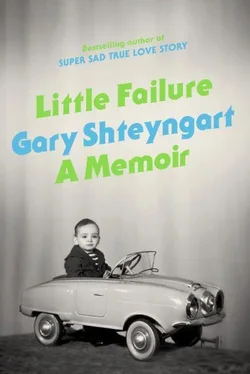As soon as I hang up, I lustfully fire up my silver pot pipe and blow smoke at the Beaver until he stalks off for the library. Then, free of his redheaded, freckled, studious presence, I take care of my final need to the sound of “Baby, You’re a Rich Man.” For this, too, I will receive college credit.

I like going to classes because I can learn a lot. About the students, I mean. Here the great arias of self-involvement — far more operatic than Puccini’s “O Mio Babbino Caro”—wind their way through the boxy little classrooms as professors eagerly facilitate our growth as social beings and master complainers. I learn how to speak effectively within my new milieu. I master an Oberlin technique called “As a.”
“As a woman, I think …” “As a woman of color, I would speculate …” “As a woman of no color, I would conjecture …” “As a hermaphrodite.” “As a bee liberator.” “As a beagle in a former life.”
Only what will I say? Whom will I speak for? I raise my hand. “As an immigrant …” Pause. All eyes on me. This isn’t Stuyvesant; here immigrants are a rare, succulent breed, even if the ones present usually have parents who own half of Lahore. “As an immigrant from the former Soviet Union …” So far, so good! Where can I take this? “As an immigrant from a developing country crushed by American imperialism …”
As I speak, people, by which I mean girls, are looking at me and nodding. I have shed every last vestige of the Hebrew school nudnik and the Stuyvesant clown. The things I say in class are no longer meant to be funny or satiric or ironic; they’re meant to celebrate my own importance, forged in the crucible of our collective importance. There is no room for funny at Oberlin. Everything we do must move the human race forward.

And here’s what’s happening to me. I’m learning. The truth of the matter is that I should be nowhere near an institution like this. Oberlin is something nice you do for your child when you’re rich. Or at least comfortable. If I would ever have an American child I would happily send her to Oberlin. Let her enjoy the fruits of my labor. Let her have both clitoral and vaginal orgasms inside a gluten-free co-op. But me? I’m still a hungry, kielbasa-fueled, fucked-up refugee. I still need to build a home in this country and then to buy an all-wheel-drive car to put next to it.
The problem is I learn too slowly. There’s a very popular upper-classman who wears a janitor’s shirt with the name BOB stenciled over his breast. I have also worked as a janitor before coming to Oberlin. My father got me a job washing floors in a former nuclear reactor in his laboratory. I was paid $10.50 an hour for buffing many hectares of radioactive floors and had to wear a device at all times that looked like a Geiger counter (the present state of my hairline reflects as much). I worked all summer long so that I could have money for pot and beer and Chinese food to buy for a prospective hand-holder, but my parents certainly supplied me with shirts and pants to wear. “Poor Bob,” I say. “He only has one shirt. As an immigrant , I know what that feels like.”
“Who’s Bob?”
“Over there.”
“That’s John.”
“Why does his janitor’s shirt say ‘Bob’?”
My hipster interlocutor looks at me as if I am a complete idiot. Which I suppose I am.
As an immigrant, my job is to fucking learn. And what Oberlin has to teach me is how to become a part of the cultural industries in a handful of American cities. How to move back to Brooklyn’s Williamsburg or San Francisco’s Mission District and be slightly known among a select group of my own duplicates. How to use the advance for the Serbian rights to my memoir to throw a killer party featuring the world’s second-worst banjo player and absolutely worst snake charmer. There’s a knock on the door of a labor seminar with my favorite Marxist professor. A package of cheese has arrived from France. The People’s Cheese we call it. The People’s Volvo. The People’s Audi TT Roadster. There are other ways to be fabulous, ways I could hardly imagine among the forty-by-one-hundred-foot lots of eastern Queens. You just constantly have to be sure of yourself. You can’t announce your ambitions. You have to join a band where you dress like a chicken. You have to complain about the Soviet Union’s recent collapse even as your parents celebrate it. You have to bring a beach bucket and shovel to your morning shower. You have to go out with someone for the duration of junior year and get rid of them when you’ve had enough, and then you have to complain about the fact that a human being actually loved you.
The truth is this: The rich will rule even at a place like Oberlin, where their kind is technically forbidden. They will simply invert the power structure to suit their needs. They will come out on top no matter what. Stuyvesant was hard but hopeful; Oberlin, on the other hand, reminds me yet again how the world works. I guess that’s why they call it an education.
My hair is growing and curling into locks and reaching toward my ass; my shirts are becoming flannelly just like Kurt Cobain’s. A child of Lenin is learning about Marxism in the Rust Belt from faculty whose office doors are festooned with signs reading CARD-CARRYING MEMBER ACLU and LOBOTOMIES FOR REPUBLICANS: IT’S THE LAW.
I am still majoring in politics, still paying respect to my parents’ law school dreams, but I am also doing something that Oberlin can respect as well.
I am writing again.

My first southern Christmas. Jennifer is holding the rambunctious Tally-Dog. I am so full of hush puppies and grits it hurts to lift my head.
“UH, YOUR TEETH ARE REALLY HURTING ME, Gary. Could we try something a little different?”
I have a girlfriend.
Her name is Jennifer, known to most by her initials, J.Z.
I am lying next to her. I am twenty years old. Back at Stuyvesant, I have spent several nights next to Nadine in her Queens bedroom, both our eyes closed, an eighteen-year-old-sized distance between us, me dreaming of her bony frame, her dreaming, presumably, of another’s bony frame, a digital clock soundlessly keeping time by her bedside, wasted time.
If I could compress the unrequited love of the last twenty years it is possible that I could come up with art. But that is not the kind of artist I want to become. When it comes to the world, I want to know it, touch it, taste it, and indefinitely hold it. Twenty years old, post-Leningrad, post — Hebrew school, postchildhood, post-God, I am a materialist without possessions. I do not believe in a Russian soul. The heart is an important organ, but it is just an organ. You are not what you want. You are what wants you back. Everything begins with her. Everything begins on the night when I lie with her in a building elegantly named Keep Cottage, a rambling timber-and-stucco mansion housing one of Oberlin’s renowned dining and residential co-ops, the kind where bees are kept safe from exploitation and a lone terrorist known as the Bacon Bomber, operating under cover of night, dusts the next day’s hummus supply with his eponymous foodstuff.
I have a girlfriend. I do not fully know how to kiss her, but I have a girlfriend. Thank you, Oberlin College. Without your extended welcome to the weird, without your acceptance of the not yet fully baked, without the fathomless angst you impose on all those who walk under your Memorial Arch, the angst that leads to the hapless intercourse your students have been waiting for throughout their miserable teenage existences, without these things it is conceivable that I would not have ravaged a woman with my Pentagon-shaped Soviet tusks until my thirties. It is also conceivable that without you I could have gone to Fordham Law School. But more on that later.
Читать дальше














